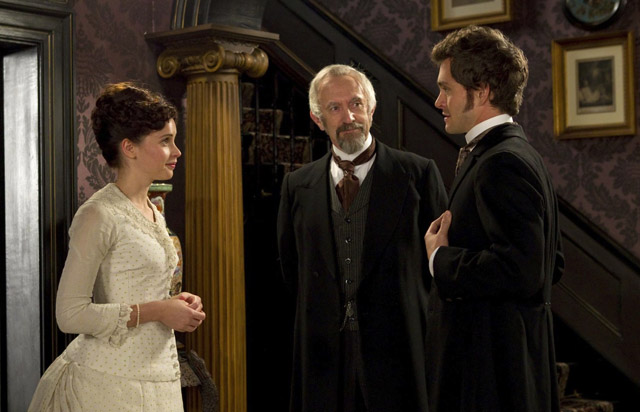CHICAGO – In anticipation of the scariest week of the year, HollywoodChicago.com launches its 2024 Movie Gifts series, which will suggest DVDs and collections for holiday giving.
Good Vibrations for Maggie Gyllenhaal in Uneven ‘Hysteria’
 Rating: 3.0/5.0 |
CHICAGO – Combining late 19th century Victorian England with the invention of the vibrator is a surefire laugh getter, but unfortunately “Hysteria” adds in a romance subplot and doesn’t climax. Maggie Gyllenhaal, Hugh Dancy, Jonathan Pryce and Felicity Jones add to the buzz.
The term “hysteria” refers to a condition that was fostered upon women as a catch-all medical explanation for ennui, depression or nervousness caused by sexual frustration – this simply wasn’t talked about in the days of Queen Victoria. When a male doctor builds a huge practice just by applying manual stimulation to the condition, using technology to invent a vibrating machine is the logical and hilarious next step. The film is a one joke premise delivered with understated absurdity, but also wants to be a warm and fuzzy romantic romp, and that’s when it gets in the way of itself.
Charlotte (Maggie Gyllenhaal) and Emily (Felicity Jones) are sisters whose father is Doctor Robert (Jonathan Pryce), the manual practitioner of curing the woman’s malady known as hysteria. When his appointment book becomes too large to handle alone, he hires a young doctor named Mortimer (Hugh Dancy) to pick up some of the slack. The curing touch is clinical in nature, and soon Mortimer needs to find a way to cure his own carpal tunnel syndrome.
 Photo credit: Liam Daniels for Sony Pictures Classics |
The solution lies with Mortimer’s rich and eccentric inventor friend, Edmund (Rupert Everett). His experiments with the new fangled electrical current causes a vibration into a separate machine. After a few experiments, the vibrator is born. There is also a love triangle of sorts, as Emily takes up with Mortimer, but Charlotte is always lingering in the picture. The last quarter of the film has to do with a trumped up charge on Charlotte and a trial that symbolizes the society’s attitude toward women and their bouts of hysteria.
The sexual stuff is cheeky, and mostly works. The realization is in the fact that the doctors become prostitutes themselves, “servicing” the British female population for a fee. And given their clinical attitude towards the task (the clock is shown many times as they apply the massage) have the same nonchalance and disdain as female prostitutes. Director Tanya Wexler creates a scenario where a range of women in both age, education and social strata get off in their own way. The commonality of sexual ignorance, and the dismissal of female needs as needing it’s own medical term, is shown properly ridiculous and funny.
The cast is top notch, as well. In an interview with HollywoodChicago.com, director Wexler noted that casting American Maggie Gyllenhaal as a British social worker was purposeful, her position as an ahead-of-her-time female rebel was that of an outsider. Hugh Dancy as Mortimer is cooly proper as the young doctor, especially set against a wild performance from Rupert Everett as his eccentric inventor friend. Jonathan Pryce proves his stellar competence again, his high station as a British doctor is nicely contrasted with his magic massaging fingers. And Felicity Jones represents young Victorian ladies quite succinctly.
Unfortunately it is the romance part of the equation that brings the film down. Again, director Wexler said that the film was always developed as a romantic comedy, it’s just that the romance part of that description doesn’t stand up to the theme of the invention of the vibrator, which in its subtlety is hilarious. The whole thing falls off the table with Charlotte’s arrest and trial, which leads to coupling with Mortimer, yada, yada, yada.
 Photo credit: Ricardo Vaz Palma for Sony Pictures Classics |
There is a symbolism for current society in the narrative regarding women’s rights, and what is shown to be ridiculous – equating human sexual response to a medical condition – was actually believed in the pure patriarchal leadership of that day. In that sense, how are we different? We constantly have male legislators and courtrooms passing judgment on how women are supposed to contend with their medical/reproductive issues. It becomes about control, and inventing the vibrator shifted a bit of that control. Human beings, in their own sexuality, should opt for the less controlling element of good vibrations, especially when private medical rights are concerned.
There is an end sequence in the film, which goes over the history of marketing the vibrator, from its medical roots to its current application as a “toy.” In taking in that history, a quote from Jesus Christ Superstar is apropos – “What’s the buzz, tell me what’s happening.”
 | By PATRICK McDONALD |



"Hysteria"
Set in the Victorian age i still find it hard to believe that they thought that the female orgasm did not exist!!!
Hysteria
Very funny and a nice love story